#rue bourbon
Text
youtube
Hey there! Good morning, good afternoon, and good evening to you! Here, have a little music from the Simon Burke Jazz Band to make your day better. Simon and his band will be performing for us at our Saturday evening Mardi Gras-themed party at Belle Epoque. Still have a few tickets available, would love to have you join us!
#miss fisher's murder mysteries#mfmm#miss fisher con#missfishercon#miss fisher and the crypt of tears#the adventuresses’ club of the americas#phryne fisher#every cloud productions#ms fisher's modern murder mysteries#acorn tv#peregrine fisher#miss s#miss s murder mysteries#nathan page#royal sonesta#royal sonesta new orleans#new orleans jazz#new orleans music#new orleans#nola#big easy#crescent city#belle epoque#rue bourbon#old absinthe house#absinthe#Youtube
7 notes
·
View notes
Text
People being kept out of the Duplay house compilation
…It was necessary, in order to reach the eminent guest deigning to inhabit this humble little hole of a place, to pass through a long alley flanked with planks stacked there, the owner's stock-in-trade. This alley led to a little yard from seven to eight feet square, likewise full of planks. A little wooden staircase led to a room on the first floor. Prior to ascending it we perceived in the yard the daughter of the carpenter Duplay, the owner of the house. This girl allowed no one to take her place in ministering to Robespierre's needs. As women of this class in those days freely espoused the political ideas then prevalent, and as in her case they were of a most pronounced nature, Danton had surnamed Cornelie Copeau "the Cornelia who is not the mother of the Gracchi." Cornelie seemed to be finishing spreading linen to dry in the yard; in her hand were a pair of striped cotton stockings, in fashion at the time, and which were certainly similar to those we daily saw encasing the legs of Robespierre on his visits to the Convention. Opposite her sat Mother Duplay between a pail and a saladbasket, busily engaged in picking salad herbs. Two men in military garb, standing close to her in a respectful attitude, seemed to be taking part in the duties of the household, obligingly picking herbs, in order to be free to chat more unrestrainedly under the shelter of this familiar occupation. These two men, since famous in their respective positions, were, the one General Danican, who since then, on the 13th Vendemiaire, became impressed with the idea that he was a Royalist, and who perhaps still retains the belief because he is one of England's pensioners; the other was General, later on Marshal, Brune. Freron and I told Cornelie Copeau that we had called to see Robespierre. She began by informing us that he was not in the house, then asked whether he was expecting our visit. Fréron, who was familiar with the premises, advanced towards the staircase, while Mother Duplay shook her head in a negative fashion at her daughter. Both generals, smilingly enjoying what was passing through the two women's minds, told us plainly by their looks that he was at home, and to the women that he was not. Cornelie Copeau, on seeing that Freron, persisting in his purpose, had his foot on the third step, placed herself in front of him, exclaiming: ”Well, then, I will apprise him of your presence," and, tripping upstairs, she again called out, "It’s Fréron and his friend, whose name I do not know." Fréron thereupon said, "It’s Barras and Freron," as if announcing himself, entering the while Robespierre's room, the door of which had been opened by Cornelie Copeau, we following her closely.
Memoirs of Barras: member of the Directorate (1899) page 167-169, regarding a meeting he and Fréron tried to have with Robespierre following their return from Marseilles in March 1794.
Very little time before the cathostraphy where Camille Desmoulins was victim, Joseph Planche, the humanist, the old rhetorics professor at the Bourbon college, who was strongly tied to him, met him in the hooks around Rue de Tournon. Camille was concerned, and told him: ”I’m lost. I went to see Robespierre, and he refused to see me.”
Historie de Robespierre et du coup d’état du 9 thermidor (1865) by Ernest Hame. According to J.M Thompson’s Robespierre (1935), Hamel obtained this anecdote from a friend of a friend of the mentioned Planche.
”…Try to see Maximilien, [said Charlotte Robespierre], you will be content; he was very glad that our younger brother saw you at Melun. On this occasion he spoke with interest of the exercises of your pupils and of the attention you had in entrusting him with presiding over them. I won’t introduce you to him, I would not succeed; I even advise you not to speak to him about me. You will be told he is out, don't believe it, insist on your visit.”
The Robespierre family was housed on rue Saint-Honoré, near the Assomption chapel, the sister and younger brother at the front, the older brother at the back of the courtyard. Gaillard went to Maximilien’s apartment; a young man, looking at him with the most insolent air, said to him, barely having opened the door: “The representative isn’t home…”
“He may not be there for those who come to talk to him about business, but that is not my doing; I will talk to him about his family that I know a lot, you have seen me come out of his sister's apartment who is involved in state affairs no more than I am... Bring my name to the representative, he will receive me, I’m sure of it.”
The fellow did not dare refuse to carry a paper on which Gaillard had taken care to indicate himself in such a way as to be recognized, he immediately came back and gave the visitor his paper saying: “The representative does not know you,” and the door was violently slammed shut!… . The insolence of this brazen man whom Gaillard knew to be the secretary of Robespierre, son of Duplay, to whom the sister attributed the excesses of his brother, the sorrow he felt at losing the hope of saving the judges of Melun and to ensure his personal rest, all these thoughts made him very angry; he calls the young man a liar, insolent, he accuses him of deceiving Robespierre and of increasing the number of his enemies every day, all this in the loudest voice with the intention of being heard by Maximilien and lure him to one of the windows where, surely, he would have recognized him. New disappointment, no one appears and Gaillard goes back to tell Mlle Robespierre about his misadventure.
“I prepared you for it, she told him. ”No one can approach my brother unless he is a friend of those Duplays, with whom we are lodging; these wretches have neither intelligence nor education, explain to me their ascendancy over Maximilien. […]”
La Révolution, la Terreur, le Directoire 1791-1799: d’après les mémoires de Gaillard (1908) page 264-265. This anecdote gets described as taking place somewhere in May 1794.
4 prairial, year 2 of the French Republic, one and indivisible
Nine o’clock in the evening a young girl presented herself at the house of citizen Duplaix [sic], asking to see Robespierre and saying that she had been looking for him for three hours. At the response made by citoyenne Duplaix [sic], the eldest daughter, that Robespierre wasn’t there, this young woman said that it was very surprising he was not at his house and showed a lot of impertinence and humor by saying that he was a public official and made to respond to all those who could come to his house; these threats obliged us to take her to the Committee of General Security.
Signed: Chatelet.
Note written by an agent May 23 1794. The ”young girl” in question is Cécile Renault. Cited in Histoire du tribunal révolutionnaire de Paris: avec le journal de ses actes (1881) by Henri Wallon, volume 4, page 5.
Those whom fate did not lead to the Duplay family presume that it was enough to be introduced to them to see Robespierre: they are wrong; I appeal to the testimony of all his former friends; not one could reach him: the entrance to his residence, similar to Tartarus, was constantly guarded by Cerberians who overshadowed everything... You, whom terror has compressed for so long, have you understood it well? No: to feel its full weight, compelling circumstances would often have had to drag you into its temple, where the sinister look of a Chalabre was sometimes equivalent to a death sentence; where once suspected your loss was sworn, which you accelerated even by no longer going there.
À Maximilien Robespierre aux Enfers (1794) by Paul-Auguste Taschereau-Fargues, page 11.
A young and pretty person aged 17 to 18, accompanied by her aunt, arrives one morning, by carriage, at Robespierre's door, to ask for her father's liberation. These two women speak to Mother Duplay, who they ask if Robespierre is avaliable. “No,” this she-cat replies abruptly. This initial reception intimidated the young person so much that, without daring to open her mouth, she sadly returned to her carriage. As she was about to climb into it, she said to herself that the way in which she had been received was perhaps the result of a lack of formality towards this woman whom, due to her dirty and disgusting attire, she took for the servant of the house. She therefore returns, the 25 livres assignat in hand, to try to make the female dragon yield. Femme Duplay eagerly runs to meet her, and, grabbing her by the arm, says to her: “Now that you are alone, you can go up. Citizen Robespierre really likes young people your age.” This innocent girl got so disturbed that she immediately went back to her aunt, whom she told, completely frightened, about her adventure.
Notes et souvenirs de Courtois de l’Aube, député à la Convention nationale, cited in La Révolution française: revue d’histoire moderne et contemporaine (1887), volume 12, page 929-930.
#robespierre#duplay family#frev#frev compilation#éléonore duplay#françoise duplay#simon duplay#charlotte robespierre#fréron#barras#forget guard dogs where can i get myself a guard duplay
26 notes
·
View notes
Text
On March 16 [1815], the very next day after the private interview between the Duke of Otranto and Louis’ brother, a detail of royalist police was dispatched to the Rue Cerutti to arrest Fouché. The reasons for this action are unclear. (…) On the policemen’s arrival at his Rue Cerutti residence, Fouché delayed agent Foudras of the Paris prefect in the entryway with some complaints about the formalities of the arrest warrant. (Fouché would later put Foudras on his payroll.) Suddenly, Fouché bolted through a secret door and down the hallway, ran out into his garden, and scrambled up a ladder which he had left leaning against the wall. He thereupon dropped down into the adjacent garden, behind the mansion belonging to Napoleon’s stepdaughter and Louis Bonaparte’s estranged wife, Queen Hortense… and fled out into the street. From there the Duke of Otranto, apparently quite spry for someone almost 56, threw off his pursuers by hopping into a carriage, and made his way to the safe-house of a retired secretary-general of the Paris police (a former Oratorian), to await the imminent collapse of the Bourbons.
—Rand Mirante, Medusa’s Head: The Rise and Survival of Joseph Fouché, Inventor of the Modern Police State
Foudras: we have a warrant for your arrest
Fouché:

49 notes
·
View notes
Text
Victor Hugo on Talleyrand's death
For @empirearchives who was interested, here's a translation of Victor Hugo's text about Talleyrand's death. My thanks to @microcosme11 for her help <33
Choses Vues, Victor Hugo
1838
Talleyrand
19th of May
In the Rue St-Florentin, there is a palace and a sewer.
The palace, with its noble, rich, and dull architecture, was long called "Hôtel de l'Infuntado"; today, we read on its front door: Hôtel Talleyrand. During the fourty years he lived on this street, the last host of this palace might never have set eyes on this sewer.
He was a stranged, feared, and considerable character: his name was Charles-Maurice de Périgord; he was noble as Machiavel, a priest like Gondi, defrocked like Fouché, witty as Voltaire, and lame as the devil. One could say that everything limped with him: the nobility which he had put to the service of the republic, the priesthood he had dragged on the Champ-de-Mars then threw down the drain, the marriage he had broken by twenty scandals and by a voluntary separation, the wit he dishonoured through vileness. This man, nevertheless, had grandeur.
The splendours of both regimes were mixed together inside of him: he was prince of the old kingdom of France, and prince of the French Empire.
For thirty years, from the depth of his palace, from the depth of his mind, he had just about led Europe. He had let the revolution call him "tu", and had smiled at it, ironically of course; but it had not noticed. He had approached, known, observed, pierced, stirred, upturned, delved into, mocked, intellectually fertilized all the men of his era, all the ideas of his century, and there had been a few minutes in his life when, holding in his hand the four or five fearsome threads that moved the civilized universe, he had had for a puppet Napoleon the First, Emperor of the French, King of Italy, Protector of the Confederation of the Rhine, Mediator of the Swiss Confederation. Such was the game this man played.
After the Revolution of July, that old race, whose grand chambellan he was, having fallen, he found himself standing on one foot and told the people of 1830, sitting, bare-armed, on a pile of cobbles: Make me your ambassador.
He had received Mirabeau's last confession and Thiers' first confidence. He had said himself he was a great poet and had made a trilogy in three dynasties: Act I, Buonaparte's Empire; Act 2, The House of Bourbon; Act 3, The House of Orleans.
He had done all of this in his palace, and, in this palace, like a spider in its web, he had attracted into it and taken successively heroes, thinkers, great men, conquerors, kings, princes, emperors, Bonaparte, Sieyès, Mme de Staël, Chateaubriand, Benjamin Constant, Alexander of Russia, Wilhelm of Prussia, Francis of Austria, Louis XVIII, Louis-Philippe, all the golden, shiny flies who buzzed in the history of those last fourty years. The whole sparkling swarm, fascinated by this man's deep eye, had successively passed under the dark door that bore, written on its architrave: Hôtel Talleyrand.
Well, the day before yesterday, 17 March, 1838, that man died. Doctors came and embalmed the corpse. For this, like the Egyptians, they first withdrew the bowels from the belly and the brain from the skull. Once done, after they had transformed the prince de Talleyrand into a mummy, and nailed this mummy in a white satin-lined coffin, they withdrew, leaving upon a table the brain, that brain which thought so many things, inspired so many men, built so many edifices, led two revolutions, fooled twenty kings, contained the world.
Once the doctors were gone, a valet entered, he saw what they had left. Hold on! they forgot this. What to do ? He remembered that there was a sewer in the street, he went there, and threw that brain into this sewer.
Finis rerum.
73 notes
·
View notes
Text
wip prompt title meme
I was tagged by @pia-writes-things (thank you! ❤️)
Prompt: Make a new post with the names of all the files in your WIP folder, regardless of how non-descriptive or ridiculous. Let people send you an ask with the title that most intrigues them, and then post a little snippet or tell them something about it! And then tag as many people as you have WIPs.
I'll start with the disclaimer that most of these are definitively inactive and won't ever see the light of AO3, but here you go! By fandom:
L'art du crime
Adc 2
Sa muse 2
(I know, I know, the originality of my titling policy is riveting)
HPI
Rue déserte
Secret dating (une porte entrouverte sur un peut-être)
Disastrous pre canon first date
Bourbon virus fic
Good Girls
European butter
Kun pao chicken
Acbtm c13
champagne room
Beth x Phoebe
Awkward roommates
Western au
I won't tag as many people as there are wips here because that's A LOT, but I'll tag @asteraceae-blue @sothischickshe @sdktrs12 @riosnecktattoo @michelleelizabethtanner @hemerae-ramblings @luluonthemoon
14 notes
·
View notes
Text
A Night in New Orleans
Years before Jean-Luc adopts Remy, he watches him from the balconies and galleries of the French Quarter and wonders if he's doing the right thing. While he wonders, others have plots of their own and Remy, oblivious to it all heads to bed.
The boy was growing and as he did, Jean-Luc LeBeau found himself worrying for him.
He had already removed the child from the Antiquiary but he couldn't remove the boy's eyes from his head nor the whispers and rumors that circulated about him through the air and through the guilds.
He watched the child from a gallery one night as the boy picked pockets along Rue St. Anne.
The boy wore dark shades to hide his eyes now, big, plastic lenses obscuring his face. He didn't know he was being watched but Jean-Luc knew and he knew he wasn't the only one watching that night.
Above the crowed of tourists and drunks, locals out for fun and a million sweating bodies he saw familiar faces on galleries around him. Dark faces hidden in shadow and he knew there was a plot.
People were scared of the boy. His own people. People who should have heeded his words and didn't. He'd said the boy wasn't to be touched and yet here he was, watching them, watching the boy, watching them watch the boy and down below the child had no idea.
His life consisted of reporting his ill gains to Fagin and avoiding a swat to the back of the head. The child didn't know the war fought over him and Jean-Luc wanted to keep it that way. It was better while the boy was still young.
Even this kind of childhood was better than none.
Even so his eyes followed the man across the street. Bourbon was loud tonight and people spilled out of doorways, sweating and wilting in the evening humidity. Even as a native he thought it was hot out that night and his eyes followed the boy who had stopped to watch a Dixie Land Band lead a wedding procession out of the St. Louis Cathedral.
The boy leaned against the fence around Jackson Square and watched them, eyes following the party behind his glasses. Jean-Luc wondered if he had ever been to a wedding. Most probably not, or at least not any he was supposed to have been at.
No one notices the child alone and yet his eyes follow him as the child unwraps his arms from around the fence and saunters off. He dips his little hand into a purse as he does and scoops out a wallet.
Jean-Luc feels a measure of pride for this child he's never spoken too. He's got a son of his own, Henri is a little older and everything he could have ever hoped for but he's always felt a kind of connection with this child, since the night he'd stolen him from the hospital.
There's music pouring into the street and below Remy walks on, not knowing he's being watched, not knowing he's got a destiny. He doesn't have any idea that there's expectations waiting for him.
Jean-Luc wishes he could protect the boy from them but he can't. He's the leader of the Thieves Guild and one boy can't be put above the Guild. Not even his own son Henri could take priority. There's older and more powerful things at play.
Jean-Luc watches the men across the street. Their eyes are fixed on the boy and he doubts they have any good plans for him.
He closes his hand around the railing and frowns hard, the French Quarter below him, spilling the masses onto her streets, hiding a little boy with demonic eyes.
Across town, his own son is asleep in his bed in their garden district manor. He's surrounded by iron fences the old south there, heavy curtains on the windows and antiques. Henri sleeps well and he feels a kind of guilt as he watches Remy in his dirty jeans and old t-shirt. This boy doesn't know anything about that world.
He watches them and then they move, following the boy. He follows them, silent and hidden, they haven't seen him yet but he isn't the leader for nothing.
They move in, hovering from galleries like carrion birds over the boy who walks on oblivious.
Jean-Luc catches up to them when the boy cuts away from Bourbon Street and begins to wander out of the French Quarter, away from the noise and crowed streets.
He knows a few of the places the boy goes to sleep in. He's already staking himself away from Fagin, already too smart for the man. Soon he'll have to take the kid away from Fagin or else risk wasting him. The kid is good but tonight he's just a kid.
"What do you think you're doing?" He asks as he catches up to the other thief. He knew it was Marcus Delacroix from afar. Now that he see's him up close he can see the look on the mans face and knows Marcus didn't know he was watching.
He savors the element of surprise and asks again. "What are you doing?" He asks. "I told you eight years ago that the boy was off limits. I'll handle him."
Marcus hangs for a second before righting his posture. "I remember but you can't trust him, Jean-Luc."
Jean-Luc isn't about to hear this. He knows the superstitions, he's kept then in mind just in case. He knows. "We're not assassins, Marcus." He says. "We're you really planning to harm the boy?"
They're standing on a roof top now, watching the boy as he picks his way along the less crowded streets outside the French Quarter.
"Not harm." Marcus whispers, looking down at the child.
"Then what?"
"Was gonna take him to the Bayou."
Jean-Luc scowls, not pleased and not surprised. "And do what with him?" He asks, knowing probably what. "Hope the gators take care of him for you? Dat boy wouldn't be done that easy, even you should know that."
Marcus winces. "He's dangerous, Jean-Luc. Everyone can see it."
He can see their superstitions. He's heard it all before. "They're just rumors." He says. "And he's just a little boy."
"You know that ain't no boy." Marcus scoffs, voice a little hurt.
Jean-Luc shrugs. "You t'ink so? I wish I could t'ink that way." He looks down at the boy, farther away, disappearing into shadows and the summer heat. What fucking life is he giving this child?
Marcus shakes his head. "Don't know what power he has over you." He says. "De boy will bring us ruin, Jean-Luc. Everyone knows it."
"Everyone knows what they've been told and it's men like you doing the telling, Marcus."
Marcus gives him a grieving look this time, mind unforgiving, unable and unwilling to understand.
The boy is gone.
"He'll doom the Guild."
"Or save it."
Marcus nods, quarry lost, plans aborted. Remy gone. "Maybe." He whispers.
Jean-Luc understands and wishes he still had eyes on the boy. It's when he feels the least guilty.
Remy however is gone into the night and of course knows how and where to hide from the world.
Jean-Luc goes home and watches Henri sleep, wondering if his own son understands how much he loves him. Wondering if he'll forgive him when he gets old enough to know him.
He wonders where Remy is sleeping, knows he's not in a bed like Henri. Know's he's not safe and loved like Henri and he feels like he's letting two children down.
Out there among the street lamps and stars, the one way streets and cemeteries the shot gun houses and superstitions, Remy has a little place to rest and for the night he sleeps unaware
But destiny is coming for him and it'll come in the shapes of Guilds and marauders, X-Men and lovers. Mistakes and trusts and while Jean-Luc knows the boy has a fate he has not a clue of these things.
When he closes the door to his son's room he only knows that Remy is out there asleep and he feels guilt he can't explain. Guilt unfitting of a Guild leader. Guilt of a father and in just a few years time that's what he'll be to the boy. He'll have two sons then and he won't feel he's doing any better.
#fanfiction#jean luc lebeau#remy lebeau#fathers and sons#family#hurt/comfort#x-men#marvel#xmen#x men#comics#fanfic#attempted kidnapping#parenting#sort of#theives guild#mutants
7 notes
·
View notes
Text
I could be there too, if the devil hadn't transported me to the other side of the ocean; if he offered me the whole New World, he would not make me renounce that part of the old one in which I had the good fortune to be born and to live. To my taste there is nothing so charming as to be a native of the Auvergne, and even of the Upper Auvergne, be it said without vanity, and to live in the Rue de Bourbon in a house that, if it isn't the most beautiful, is at least infinitely pleasing.
the Marquis de La Fayette to the Prince de Poix, October 24, 1784
Idzerda Stanley J. et al., editors, Lafayette in the Age of the American Revolution: Selected Letters and Papers, 1776–1790, Volume 5, January 4, 1782‑December 29, 1785, Cornell University Press, 1983, p. 269.
#quote#letter#marquis de lafayette#la fayette#french history#american history#american revolution#history#prince de poix#france#1784
13 notes
·
View notes
Text
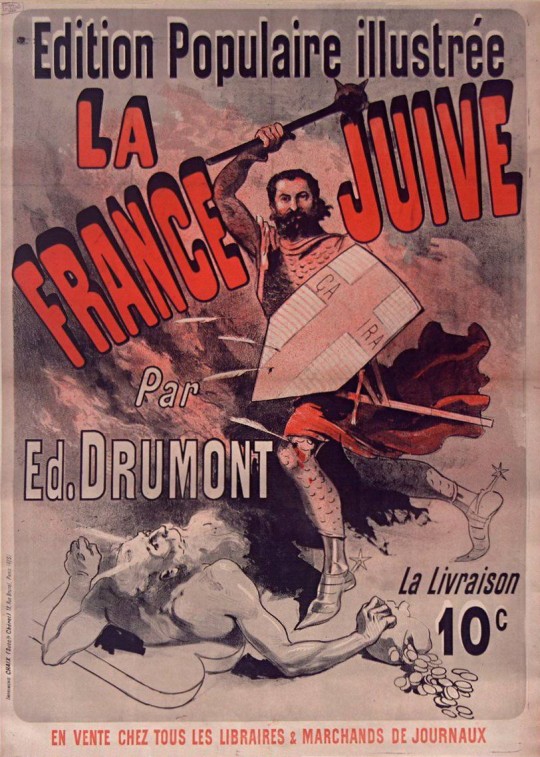
« Au début de l’année 1934, éclatait encore une fois un gros scandale financier de la Troisième République, l’escroquerie des Crédits municipaux, ayant, comme par hasard, pour principal auteur un Juif russe naturalisé, Stavisky. La complicité dans cette filouterie d’une justice putréfiée – ses personnages n’ont point changé – de la plupart des politiciens radicaux et maçons, n’avait jamais été plus flagrante. La presse et les organisations de droite s’en emparèrent, firent une campagne énorme. L’opinion suivit. Camille Chautemps, président du Conseil, le plus lourdement compromis parmi les protecteurs avérés du coquin juif, dut se démettre le 27 janvier. Son remplaçant, Daladier, apparut dès ses premiers actes comme le radical réputé "dur", chargé de sauver le parti et ses loges. Les manifestations de rues conduites par les troupes d’Action française se multipliaient et s’amplifiaient de jour en jour au chant du Ça ira.
L’extrême-gauche communiste amorçait une campagne parallèle. Le limogeage du préfet de police Chiappe, d’un arbitraire grossier, acheva de mettre le feu aux poudres. Le 6 février au soir, le rassemblement de plusieurs centaines de milliers de Parisiens, sur la place de la Concorde, prit rapidement l’aspect d’une insurrection populaire, ayant pour but immédiat l’Assemblée du Palais Bourbon. La police, fidèle en majorité au préfet éconduit réagissait mollement. La garde mobile créée par un ministère de droite contre les "rouges", défendait le pont. Le premier barrage fut forcé. La garde tira. Le premier mort tomba vers sept heures et demie. La manifestation, plus ou moins disloquée, devenue sporadique et qui, jusque-là, avait compris de nombreux curieux, se regroupa beaucoup plus serrée, et redoubla de violence à partir de dix heures. Les assauts des Parisiens, les fusillades de la garde se prolongèrent jusqu’à plus de minuit. La journée s’acheva avec le dernier métro…
La vieille République maçonnique demeurait maîtresse du terrain. Daladier, pourtant, était démissionnaire quelques heures plus tard. Paris vécut la journée du 7 pratiquement sans État, sous le contrôle des pelotons de la garde, dont on ne savait plus à qui ils obéissaient. Le soir, enfin, on apprenait l’arrivée au pouvoir d’un "conciliateur", Doumergue, dit par Léon Daudet "Gastounet le Brandadair". La démocratie était définitivement sauvée. Les vingt patriotes militants tombés dans la nuit du Six Février – exceptions les quelques curieux tués en dehors de la bagarre – ont leurs noms inscrits en tête du livre d’or de notre Révolution. (…)
Rien ne fut plus abject que la contre-offensive des Juifs, des Maçons, de la Ligue des Droits de l’Homme, des démocrates-chrétiens, de tous les humanitaires professionnels, tombant en transes pour l’exécution de quelque terroriste chinois, pour une touffe de cheveux arrachée dans le ghetto, et n’ayant que sarcasmes et rictus joviaux devant les morts français, les morts naïfs et purs de la Concorde. Jamais le bourreau ne fut plus cyniquement érigé en victime, et martyr désarmé mué en égorgeur. (…)
Nous avons longtemps traité avec beaucoup trop de pudeur et de réserve l’un des aspects pourtant essentiels de 1934. Nous avons porté rituellement de pieuses gerbes sur les tombes de nos camarades morts. Nous avons qualifié comme il convenait – nul ne l’a fait avec plus de puissance qu’Henri Béraud – les infectes et stupides canailles parlementaires qui les firent massacrer. Nous n’avons pas assez dit que nos morts furent aussi les victimes de leurs chefs. (…)
Le Six Février 1934, les chefs nationaux n’étaient pas sur la Concorde. J’y étais, aux minutes les plus meurtrières. Je ne les y ai pas vus, personne ne les y a vus. Ils étaient donc dans leurs postes de commandement. Ce pouvait être leur place. Je les y ai vus aussi, entre deux fusillades. Ils s’y tournaient les pouces, il s’y faisaient des mots d’esprit, ils se refusaient à croire qu’il y eût tant de morts que ça ! Ils n’avaient pas une consigne à distribuer, pas une idée en tête, pas un but devant eux. Les uns et les autres étaient moralement les obligés de la démocratie. Hors d’elle, ils n’avaient aucune raison d’exister. Sur ses tréteaux, ils assumaient le rôle obligatoire de l’opposant. Sautant sur une occasion assez considérable en effet, mécontents aussi du limogeage d’un policier indulgent à leurs frasques, ils venaient de se livrer au jeu classique de l’émeute, en forme de menace tartarinesque : "Retenez-moi ou je vais faire un malheur."
Mais pour ce petit jeu-là, ils avaient mobilisé des dizaines de milliers de jeunes hommes, de croyants ingénus, d’anciens soldats. Ils les avaient excités, fanatisés, chauffés à blanc. Au moment de l’action, la foule réapprit les gestes du combat et de la barricade, avec des morceaux de plâtre, des poignées de gravier et quelques lames Gillette fichées au bout d’un bâton. Les chefs, qui les avaient jetés poings nus contre les armes automatiques, s’étaient volatilisés, les uns sans doute par calcul (je pense à l’abject La Rocque), les autres saisis peut-être de vagues et tardifs remords, n’ayant plus guère qu’un souci : nier la gravité de l’événement qu’ils avaient criminellement engendré. Cette nuit-là, j’entendis Maurras dans son auto, parmi les rues désertes, déclarer avec une expression de soulagement : "En somme, Paris est très calme !" Oui, mais c’était le calme d’une chambre mortuaire.
La suite de l’histoire ne fut pas moins déshonorante. Les "chefs" de la droite firent un concert de clameurs. Certes, les "fusilleurs" étaient ignobles. Mais que leur reprochaient les "chefs" des ligues ? Ils leur reprochaient d’avoir triché en faisant tirer. Admirable politique de ces vieillards ! Incomparable symbole de cette bourgeoisie dégénérée, qui, pour n’avoir jamais eu la virilité de prendre les armes librement, de mettre sur sa conscience quelques cadavres nécessaires, aura été le complice de ses hallucinantes et imbéciles hécatombes, après desquelles le Six Février n’est même plus un fait divers en deux lignes ! Il eût fallu, en somme, que la République laissât aimablement bafouer et reconduire à coups de canne ses gendarmes, déculotter ses députés, envahir, saccager et brûler son Parlement, le tout représentant du reste, en l’occurrence, le chef d’œuvre de l’acte gratuit. Les ministres du Six Février, inutile de le cacher, avaient le droit de tirer. C’était même un devoir. (…)
Les chefs communistes, autres tireurs de ficelles, mais ceux-là, fort avisés, avaient lancé leurs fidèles sur le pavé pour profiter à toutes fins utiles du hourvari. Mais la majorité de ses fidèles ne s’en doutait pas. Pour la première fois depuis fort longtemps, les étudiants de Paris et les prolétaires rouges, armée traditionnelle de nos révolutions, manifestaient côte à côte contre la même corruption, avec la même sincérité, au même cri : "À bas les voleurs !" Les chefs de droite n’y comprirent rien, ils n’avaient rien prévu, ils ne savaient rien voir. (…)
Le Six Février (...) engendra certainement le Front populaire, favorisa en tout cas singulièrement sa naissance, en faisant figure d’une provocation énorme, passant de loin l’idéal de ce que l’adversaire le plus machiavélique pouvait rêver dans le genre. (…) Le Six Février démontra que l’armée d’une révolution nationaliste existait en France, mais que son erreur principale avait été de ne point faire d’abord sa révolution contre de pseudo-chefs.
Cette armée n’a pas pu s’anéantir en deux lustres. Éparse, elle existe toujours. Mais le "fascisme" français à la mode de 1934 n’était pas viable parce qu’il conservait trop d’attaches avec la vieille bourgeoisie de droite. Cette bourgeoisie accumula, dans ces heures fiévreuses de la dernière insurrection du type romantique, c’est-à-dire anachronique, les preuves définitives de sa caducité, de son aboulie, de son incapacité politique, de sa désunion, de sa légèreté cocardière. »
Lucien Rebatet, Les crimes du 6 février 1934, Je suis partout, 4 février 1944
5 notes
·
View notes
Text
The Gentelman from the bar
#theoriginals #klausmikaelsonxreader
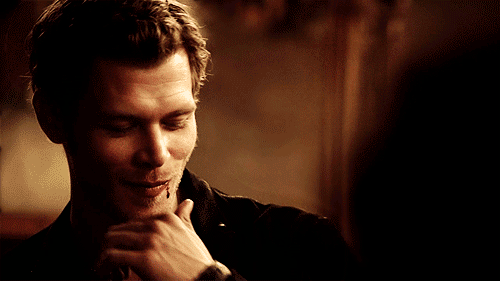
Nouvelle-Orléans, 2016
Je m'appelle T/P T/N. J'ai 19 ans et je suis étudiante en fac de psychologie, dans la même que celle de mon amie Camille. En parlant d'elle je suis justement assise au comptoir du restaurant où elle travaille.
- Hey ! Salut T/P, dit-elle en venant me faire la bise. Désolée, je ne t'avais pas vu avant, j'étais en train de servir une table, s'excusat-elle.
- T'inquiète pas, la rassurais-je.
- Tu veut quelque chose ? Demanda-t-elle en allant derrière le comptoir.
- Hum... Un bourbon s'il te plaît, repondis-je en souriant.
Nous passames le reste de la soirée à discuter, il n'y avait presque personne dans le restaurant, à part un petit groupe d'adolescents qui riait ainsi qu'un blond assis seul à une table au fond.
Vers vingt-trois heure je décide de rentrer chez moi, fatiguée mais souriante. Camille n'allait pas tarder à fermer de toute façon. Je la salua de la main et partie en direction de mon petit studio qui est à quelques rues d'ici.
Au bout de dix minutes de marche, j'entends des pas briser le silence de la nuit. Sans me retourner j'accélère le pas. Je ne suis pas du genre à paniquer pour rien mais ce soir j'ai un mauvais pressentiment. Les pas accélèrent en même temps que moi et mon souffle ce coupe. La peur prend possession de moi alors que je l'entend maintenant courir vers moi. Je m'arrête nette, attendant n'importe quoi. Une collision, une phrase lourde, voire un mec débouler devant moi. Soudain on me saisit le bras violemment pour me forcer à me retourner. Cependant, d'un coup il me lâcha et poussa un petit crie grave et étouffé. Puis plus aucun mouvement. Et, encore plus étrange, il n'y a plus de bruit. Je prend alors mon courage à deux mains et me retourne doucement. Derrière moi ce tient le blond du restaurant. Et assommé à ses pieds se tenait celui que je déduis comme mon agresseur.
- Ça va ? Me demande t-il précipitamment en se raprochant rapidement de moi. Une mine inquièt sur le visage.
- Hum oui. Je crois, repondis-je en riant nerveusement. Seulement une larme dévala ma joue et trahi ma peur.
Le jeune homme me sourit doucement et me regarda gentiment en ouvrant ses bras. Tout naturellement je vint m'y réfugier. J'adore les câlins. Il me serra contre lui, et mes sanglots redoublèrent.
- Shhh... Il ne t'arriveras plus rien. Ne t'en fait pas. Shhhh... Ne pleure plus luv... Murmurait-il en me frottant le haut du crâne.
Je souffla un coup et me détacha enfin de lui après au moins cinq minutes.
- Désolée, j'ai trempée ton t-shirt avec mes pleures, je rigola nerveusement. Il me souria tendrement et me tendit la main.
- Klaus Mikaelson. Enchanté.
- T/P T/N, de même, repondis-je en là lui serrant.
Il se baissa et m'embrassa le dos de la main. Je rougis instantanément. Il est très élégant... J'adore !
- Je ne voudrais pas être impolis mais je pense qu'il serrait préférable que tu dorme chez moi ce soir, ce serait... Plus prudent, me dit-il en regardant autour de lui.
- Oh non, je ne voudrais pas vous déranger ! Repondis-je précipitement.
- Alors tout d'abord, tutois-moi. Et ensuite, si je te le propose c'est que ça ne me dérange pas le moins du monde luv... Il prononça ses dernier mots avec une voix beaucoup plus profonde ce qui me dit frissonner.
- D-Daccord, bégayais-je, rouge de la tête aux pieds.
- Bien...
A little one but i was thinking of do a next part, what do you think abt that ?
#fanfiction#fanfic#x reader#klaus#klaus mikealson fanfiction#klaus mikaelson#klaus mikaelson x reader#young readers#female reader#klaus mikaelson x young!reader#confort#confort!klaus mikaelson#the Vampire Diaries#the originals#maybe a part 2#niklaus#niklaus mikaelson#camille#cami#camille o'connell
15 notes
·
View notes
Text
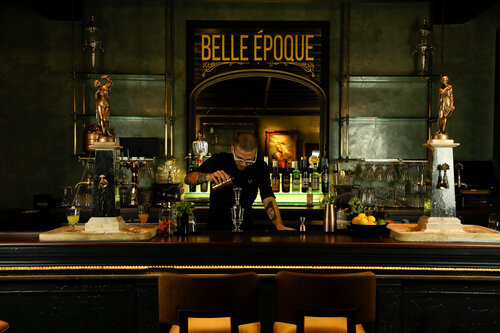


As your making your plans for Miss Fisher Con 2024 this summer, don't forget our fabulous Mardi Gras themed Con after party at Belle Epoque! Tickets are flying for this - don't delay, get yours before they're all gone!
#miss fisher's murder mysteries#mfmm#miss fisher con#missfishercon#miss fisher and the crypt of tears#the adventuresses’ club of the americas#phryne fisher#ms fisher's modern murder mysteries#new orleans#peregrine fisher#ms fisher#miss s murder mysteries#miss s#nola#big easy#crescent city#old absinthe house#absinthe#rue bourbon#belle epoque#nathan page
9 notes
·
View notes
Text
Street food aux saveurs exotiques rue de l'Aiguillerie dans le centre-ville à Montpellier.
Map map, cuisine d'inspiration asiatique et créole.


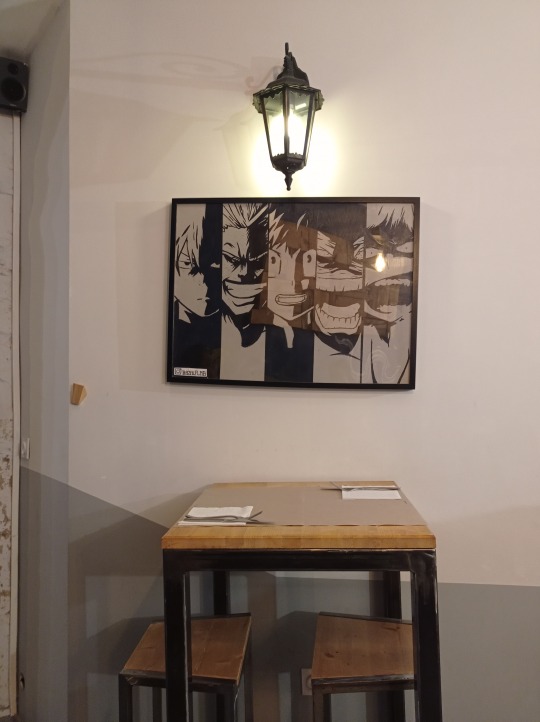



On vient ici pour :
la cuisine fait maison y compris les frites,
les bouchons au combava, un vrai coup de coeur,
les bao, ces brioches vapeur en burger, à gouter absolument,
les cocktails, rhum réunionnais, bourbon et gin japonais, vodka montpellieraine,....
le cadre très mangaesque,
et aussi pour l'accueil et l'équipe super sympa !
Menu à 25€* le soir comprenant une entrée, un plat ou un bao, une boisson et un café ou digestif. *Tarif novembre 2023.
Ouvert les soirs du mardi au samedi de 19h à 22h et les midis uniquement les vendredi et samedi de 12h à 14h.
Adresse : 57 Rue de l'Aiguillerie, 34000 Montpellier.
3 notes
·
View notes
Text
My beloved predator, spellbound in his savage garden.
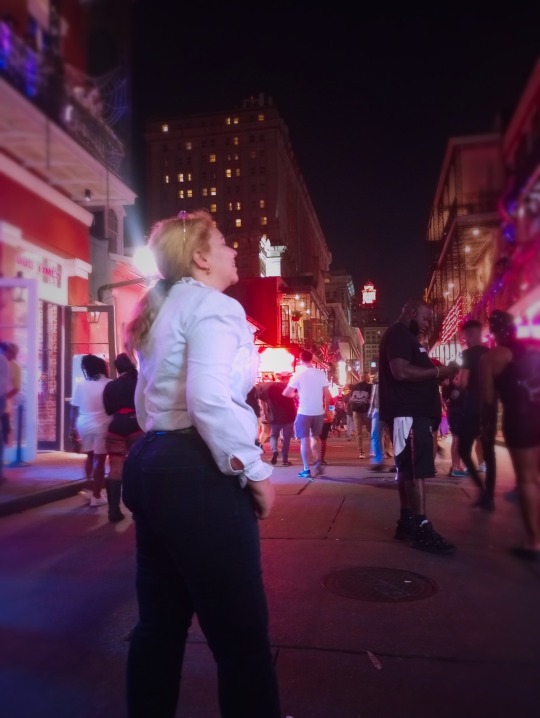
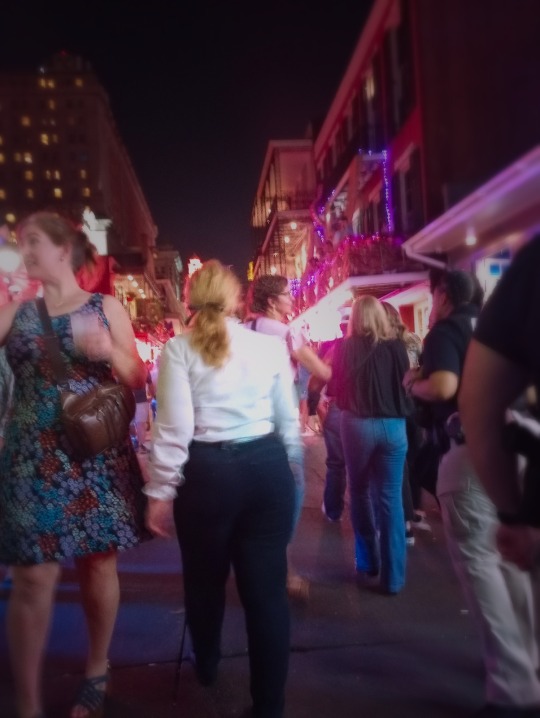
He is today as he was when he awoke in 1984, as he was when he first came to the new world, as he was as a mortal man new to Paris; absolutely transfixed by display of desire, vice, and debauchery. I can only imagine what effect seeing our Rue Bourbon transformed had upon him in the 80's but I think he gave it a good reprise tonight. I understand the savage garden he sees in humanity through his eyes.
#the vampire chronicles#louis de pointe du lac#the vampire lestat#lestat de lioncourt#interveiw with the vampire#louis pointe du lac#loustat#anne rice vampires
4 notes
·
View notes
Photo

Théophile Vautier (maître de conférence à la Faculté des Sciences) et Gabriel de Loriol (exportateur de houilles). Deux des 20 cofondateurs de l'Ecole Centrale de Lyon à la Villa Vermont, Lyon-Vaise, 1871. Photo de E. Milsom.
Le 3 novembre 1857 naît « l'École Centrale lyonnaise pour l'Industrie et le Commerce » à l'initiative de François Barthélemy Arlès-Dufour, homme d'affaires et humaniste lyonnais, et de Désiré Girardon, professeur à l'école de la Martinière désireux de « former les meilleurs élèves de la Martinière à la chimie, la mécanique industrielle, la construction civile et le dessin industriel ». L'École est installée à Lyon, à l'angle de la rue d'Enghien (future rue Vauban) et du cours de Bourbon (futur quai Castellane, puis quai Général-Sarrail). La première promotion est constituée de 14 élèves, qui seront diplômés en 1860.
9 notes
·
View notes
Note
I guess this would be a little ironic, but I wanted to ask if any of your lovers are homophobic, or upstand those kinds of beliefs outside of when they’re in the bedroom with you. I think you’ve said before that you have some that are conservative, or at least you did at some point. I didn’t know if that extended to their sexuality as well, but it would be funny if it did.
I have indeed had quite a few conservative lovers, because they tend to be the most lucrative and because that's simply more common among men of my target age demographic. However, I'm not sure that those men would read as actually (socially) conservative in the US political landscape.
Queer culture has been a recognizable staple of life in New Orleans for centuries, and drag queens in particular have been a celebrated and quite visible presence here for generations. As such the homophobia that these men express is in reference to certain behaviors. They may look down on the "faggots waving flags on Bourbon and St. Ann" (Ste Anne being the cross-street where the straight bars in the rue Bourbon give way to the gay ones) because they find something pathetic about trawling bars when they're not doing it or identifying too publicly as anything. They'll spread twenty-years old rumors about such-and-such a politician or lawyer or doctor getting caught on his knees in a glory hole stall or getting railed in a bathhouse or attending "the ballet" - an old euphemism for at least one of the city's gay strip clubs. The very old queens, in their 70s and beyond, will call every man they talk about by feminine pronouns and insinuate that even the married ones are huge closet cases and come up with impossible-to-verify stories of mid-century Hollywood celebrities coming to New Orleans and getting up to all manner of entertaining degeneracy. I can absolutely buy Tennessee Williams picking up boys in the Quarter and scandalizing his patrons; I'm less certain about stories of pool parties where Elizabeth Taylor and Rita Hayworth ate each other out, etc.
I could never be a subject for derision for them in the same way, both because that would be hypocritical and because queer people in this city no longer exist publicly as a source of occasionally interesting society gossip. Again, I have no idea how much of that would read as homophobic to an outside observer, but I'm certainly not the type to lecture them on how they ought to look at the world. It would be financially imprudent, and more importantly - I'm a New Orleanian too. I understand fully well our tendency to follow our own rules and hold little regard for the politics and traditions of the US - liberal or conservative.
3 notes
·
View notes
Text
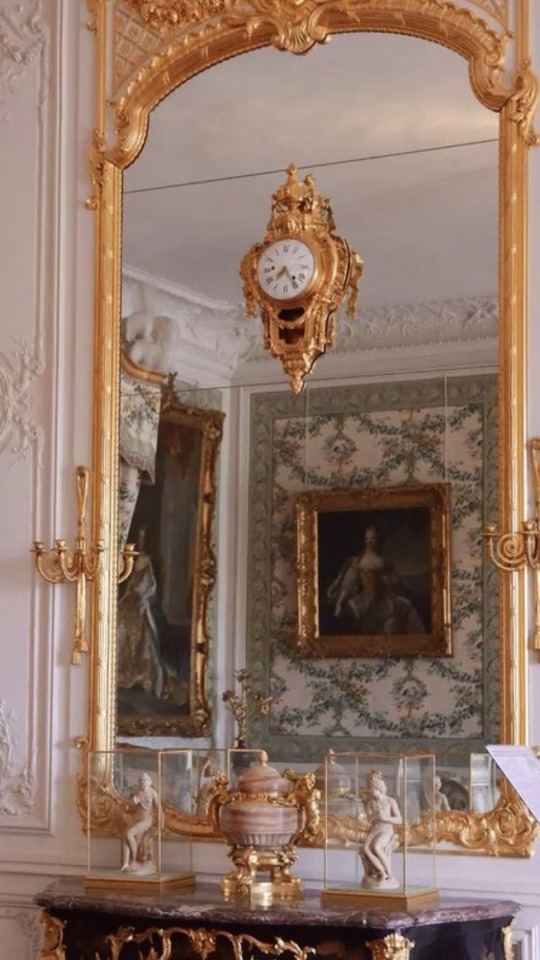
Madame Victoire
chambre à coucher
Chateau de Versailles
Versailles, France
Victoire Louise Marie Thérèse; 11 May 1733 – 7 June 1799
The French princess was the seventh child and fifth daughter of King Louis XV of France and Queen Maria Leszczyńska. She was named after her father and Queen Maria Theresa, her great-great-grandmother and the consort of Louis XIV of France.
Originally known as Madame Quatrième, signifying the fourth daughter of the King (an older sister had died in February 1733, before her birth), she was later known as Madame Victoire. She outlived eight of her nine siblings, and was survived by her older sister Madame Adélaïde by less than a year. The sisters were collectively known as Mesdames.
Reference, Achaintre, Nicolas Louis, Histoire généalogique et chronologique de la maison royale de Bourbon, Vol. 2, (Publisher Mansut Fils, 4 Rue de l'École de Médecine, Paris, 1825)
29 notes
·
View notes
Note
i think i’ve lost it since, but a bookseller in nola gave me a map of all the bookstores in the french quarter. i remember arcadian books being one of my favorites, though all are really lovely.
plus on royal street (which i ofc call the rue royale in my head) there’s a really nice stationery store (papier plume) plus a perfume store (bourbon french parfums). if y’all have been in the area, you might have already found these places, but they’re worth checking out if you haven’t yet and you’re still there.
hope you guys enjoy! nola is one of my favorite cities for many reasons including anne rice.
i don’t know how much longer you guys are staying but if you’ll be there this week for spring break i would be remiss if i didn’t mention some events. theres a ton of burlesque and cabaret shows going on this week including the lieder and lingerie opera burlesque on wednesday and the storyville burlesque show on thursday. i’ve never been to those specific ones so i don’t know if they’re the best or anything but the first one makes me think of tvc and the opera thing and the storyville one incorporates history into the show so its pretty relevant to iwtv tv. friday theres the st patricks day bar crawl and the st patricks day balcony party + a lot of other parties in the clubs. some of these you can only get the tickets on eventbrite or facebook though which is annoying.
We're back now and we saw your asks!! Thank you both so much for the reccs! We made it to all the Royal St shops and they were fantastic! Especially the perfume place, Sofi and I were super excited to visit that one the whole trip!
Unfortunately our schedule was pretty booked up so we didn't make it any specific shows, but personally if I ever go back that's at the top of my list! I'd love to spend more time in Storyville, we didn't get super far outside of the middle of French Quarter very often, but what we did see of it was really cool! I feel like we could've easily spent another eight days just in NOLA
5 notes
·
View notes